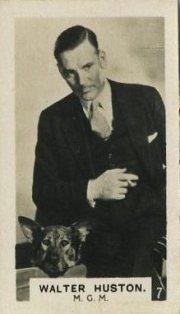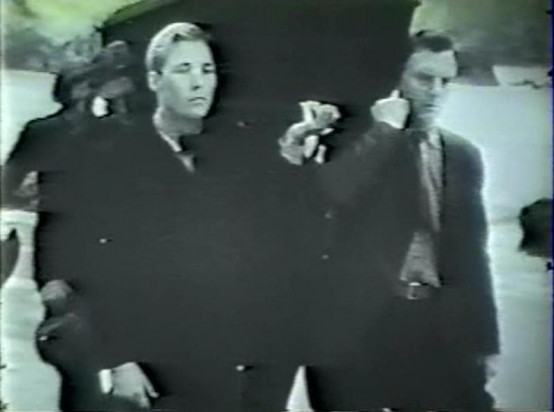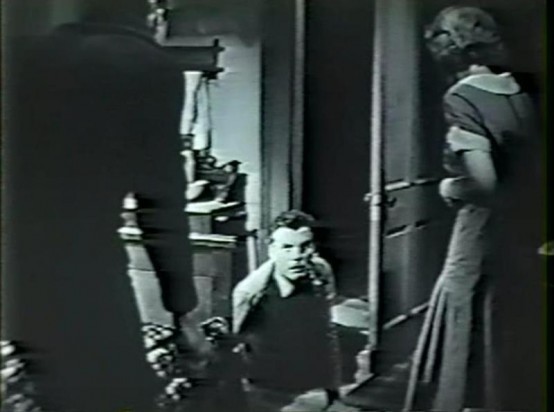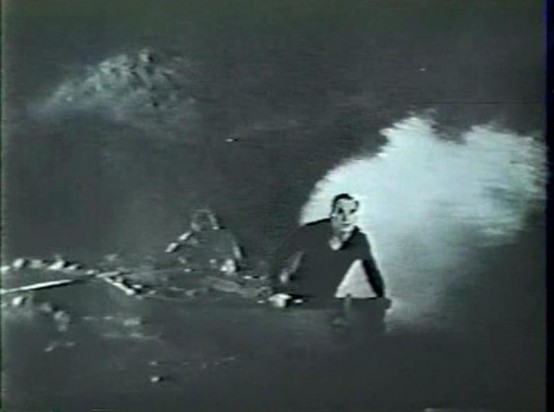A House Divided opens with a funeral on the beach. The otherwise beautiful scenery is made eerie by the dark procession and director William Wyler’s choice to let the scene to play silent except for its downbeat score. Walter Huston stands out among the mourners and along with Kent Douglass, standing out himself by virtue of his youth and Hollywood good looks, leads a group of pallbearers in carrying a casket across the beach. As we recognize nobody else, save perhaps Charles Middleton costumed as a priest, it’s safe to assume Huston and Douglass are connected, most likely father and son by virtue of their difference in age, and have lost somebody important to them. Before they make it to the burial site Douglass is too overcome with grief to carry on. Huston shoos him away and props the entire front of the coffin upon his own wide shoulders.
They return to town together, each man keeping quiet until Huston orders Douglass to hold his head up high. He drags the boy with him into a rowdy tavern where he pours a couple of shots of whiskey into him. Huston grabs a woman from the crowd like he’s plucked a fish from the sea and offers her to Douglass. He refuses so the old man gives the woman a twirl around the dance floor instead.
Walter Huston is Seth Law, a salmon fisherman in a small unnamed town in the Pacific Northwest, and Kent Douglass is his only child, Matt. Seth’s wife has just died and he mourns with a chip on his shoulder that soon finds him renewing a barroom rivalry and wrestling Big Bill (Frank Hagney) into submission with a powerful leg scissors hold. Young Matt takes the loss of his mother much harder and retreats into a lone corner of the bar as his father celebrates victory by buying the patrons a round of drinks and leading them in a rowdy song. Seth notices Matt attempt to slink out of the bar and confronts him, demanding he stay and drink. “I hate you,” Matt declares before the silenced bar crowd. “You ain’t human. I wish it was you that died instead of her!”
Seth knocks his son cold with one punch. He glares at the crowd before hoisting his boy over his shoulder and carrying him home.
Returning together from an unsuccessful catch the next day, Seth Law is impolitely greeted by his housekeeper (Mary Foy), who quits and tells him off on her way out the door. That evening, shortly after having a hearty laugh while paging through Heart and Hand magazine, Seth Law tells his son to retrieve pen and paper to write a letter for him. “We need a woman,” he tells the boy. The magazine is a matrimonial paper, filled with women looking to escape their existing lives into marriage for a new start of any kind. Seth has settled on an Ada Peterson, a hearty looking 35-year-old woman whose profile states that she’s willing to work, a good cook, lonely and loving. Matt asks if he can leave if the woman comes to be Seth’s wife. “You know, pa, I’ve never liked it here. I just never fit it.” He wants to go inland and farm. Seth inspires Matt to write a “pretty letter” by agreeing to consider this possibility.
But when Seth’s mail-order bride arrives it is not Ada Peterson. Ada had found a fellow in South Dakota before Seth’s letter ever arrived. Her friend, a nineteen-year-old beauty named Ruth Evans (Helen Chandler), has come in her place. There are sparks between Ruth and young Matt as soon as she arrives and the young woman initially thinks it is Matt who she has come to marry because Seth hasn’t even bothered to take the day off of work to come and meet her. Matt is attracted to Ruth as well, but at this point he is mostly interested in getting her to stay so he can be permitted to escape.
While Seth is initially put off by the replacement bride, he quickly realizes she has other charms that he values over the hardworking cook he originally set out to acquire. As he leers at Ruth when consenting to marry her it is obvious that this is all going to end in tragedy.
It would be another five years before the Academy Awards’ most nominated director, William Wyler, would receive his first of those twelve nominations, and so it comes as no surprise that A House Divided was marketed as Walter Huston’s latest film, not Wyler’s. In fact, Huston’s 25-year-old son, John Huston, garnered greater mention in the press than director Wyler for his role in adapting Olive Eden’s serialized story, Heart and Hand, from McCall’s magazine.
Despite seven years in Hollywood this was still early days for Wyler, not yet age 30. He had cut his teeth directing Westerns at Universal, where he worked for relation Carl Laemmle, and A House Divided was only his third talkie feature. Wyler’s first bit of major acclaim was still a couple of years away, when he directed John Barrymore in Counsellor at Law (1933), but his time at Universal was just a warm-up for a career that really began to ascend after he went to work for Samuel Goldwyn in 1935. That first Oscar nomination would come in 1937 as director of Dodsworth (1936), which happened to star the man A House Divided featured, Walter Huston, in what was his finest movie role.
 While A House Divided was just Wyler’s third talkie, Film Daily reported that it was the third film the mighty Huston was working on over a brief period of thirteen weeks! Already legendary on the stage, the 47-year-old actor was in high demand around Hollywood during this still early phase of talking pictures. After appearing in A House Divided for Universal he starred in Law and Order for that same studio and upon its completion went right to work on The Woman from Monte Carlo for First National. This all came after finishing up The Ruling Voice, also for First National, which was not even released to theaters until after he had finished work on those three subsequent films.
While A House Divided was just Wyler’s third talkie, Film Daily reported that it was the third film the mighty Huston was working on over a brief period of thirteen weeks! Already legendary on the stage, the 47-year-old actor was in high demand around Hollywood during this still early phase of talking pictures. After appearing in A House Divided for Universal he starred in Law and Order for that same studio and upon its completion went right to work on The Woman from Monte Carlo for First National. This all came after finishing up The Ruling Voice, also for First National, which was not even released to theaters until after he had finished work on those three subsequent films.
After purchasing the talkie rights to Eden’s story in July 1931, Universal immediately announced Huston as the star of the film, eventually released as A House Divided.
Later that same month Kent Douglass was announced for the role of Huston’s son in the movie. Douglass had previously won praise for his part in James Whale’s Waterloo Bridge earlier that same year, but after A House Divided he returned to Broadway, where he was already known as Douglass Montgomery.
 Born Robert Douglass Montgomery in 1907, Douglass found there already was a Robert Montgomery on Broadway when he first arrived in the mid-1920s, so the newcomer dropped his first name and played as Douglass Montgomery. Robert Montgomery also beat him to Hollywood, so when Douglass arrived in town in 1930 he was originally billed as Kent Douglass, presumably to further distance himself from the other Robert Montgomery, who was quickly on his way to stardom, possibly to additionally distance his Hollywood work from his own Broadway persona. When Douglass returned to Hollywood in 1933 to play Laurie in George Cukor’s Little Women, he returned as Douglass Montgomery, once and for all.
Born Robert Douglass Montgomery in 1907, Douglass found there already was a Robert Montgomery on Broadway when he first arrived in the mid-1920s, so the newcomer dropped his first name and played as Douglass Montgomery. Robert Montgomery also beat him to Hollywood, so when Douglass arrived in town in 1930 he was originally billed as Kent Douglass, presumably to further distance himself from the other Robert Montgomery, who was quickly on his way to stardom, possibly to additionally distance his Hollywood work from his own Broadway persona. When Douglass returned to Hollywood in 1933 to play Laurie in George Cukor’s Little Women, he returned as Douglass Montgomery, once and for all.
Among those tested for the part of romantic interest Ruth Evans was a Douglass co-star from Waterloo Bridge, Bette Davis. This provides a tantalizing footnote to A House Divided given Davis’ later relationship with Wyler as star of three of their mutually best known films, Jezebel (1938), The Letter (1940) and The Little Foxes (1941), the first of which captured Davis her second Academy Award, the others responsible for two additional nominations for each Davis and Wyler. But Davis did not get the part in A House Divided and as delicious as the thought of her and Huston crossing swords may be, it was probably for the best. Ruth Evans was a quiet part, a largely submissive role that I can’t picture Davis making much of a mark in during this early portion of her career.
 Instead the role went to Helen Chandler, a better known actress than Davis then, though mostly remembered today solely for her part as Mina in the Universal horror classic Dracula (1931). At the time of A House Divided the 23-year-old actress was in the midst of a varied film and stage career that began for her as a child actress in 1917. It was interesting to see that as late as 1966, Chandler’s obituary in John Willis’ Screen World mentions several of her key movie roles, but not her part in Dracula.
Instead the role went to Helen Chandler, a better known actress than Davis then, though mostly remembered today solely for her part as Mina in the Universal horror classic Dracula (1931). At the time of A House Divided the 23-year-old actress was in the midst of a varied film and stage career that began for her as a child actress in 1917. It was interesting to see that as late as 1966, Chandler’s obituary in John Willis’ Screen World mentions several of her key movie roles, but not her part in Dracula.
Chandler first appeared in movies in the late 1920s and found a breakout role as the young wife in Hollywood’s original adaptation of Sutton Vane’s stage hit Outward Bound for Warner Bros. in 1930. In between Dracula and A House Divided at Universal she had another key role at Warner Bros./First National in The Last Flight (1931), a film I’ll be covering in detail for a World War I-themed Blogathon come September. Chandler offered support in early Katharine Hepburn vehicle Christopher Strong (1933), but her acting career soon fizzled and Miss Chandler went on to live a largely tragic life. Alcoholism began a downward spiral and contributed to her disfigurement in a 1950 fire and subsequent institutionalization later that decade. Her tragic times have recently been covered in greatest detail to date in Gregory Mank’s latest book, The Very Witching Time of Night, which relies on the intimate memories of Chandler’s sister-in-law, a close friend to the actress from the time of Dracula.
The father, son and wife are the only three characters of any consequence in A House Divided. The film is a showcase for Huston’s character acting talents and the two younger actors are each fragile enough to aid in pushing this melodrama towards the edge of horror.
Douglass reminds me of another fair-haired young leading man who was effective in support of Huston, Phillips Holmes. While Douglass lacks Holmes’ intensity he trumps him in vulnerability. In fact, Kent Douglass spends most of A House Divided terrified of his father, wearing an expression that made me think of an abused hamster. He is rallied to courage only when Chandler’s character finds herself at risk and that occurs on more than one occasion thanks to Huston’s virile Seth Law.
Helen Chandler is such an interesting actress to watch. Initially she strikes you as capable of only wide-eyed horror, often wearing the same expression of terror that so often swept her face throughout Dracula. It doesn’t take much to turn her towards that startled stare, but given the fragile and inexperienced quality of her youthful character in A House Divided it is fitting. Unwanted by a father who’s cursed with six daughters and no ready help on the farm, she takes the opportunity to escape her Montana home because father “thought it was best.” The line comes and goes with such sorrow that it implies an escape from more than just farm work. The prospect of giving her body over to Seth Law fills her with such terror that she even threatens to kill herself, yet that all fades away when she is alone with his son, Matt.
There is a special quality about the pairing of Chandler with Douglass that comes through to the viewer and makes the idea of her being with Huston all the more repulsive. He seemingly flubs a line as they set the dinner table together, but his recovery made me feel as though I were watching a private moment between the two that wasn’t meant for the camera. A conversation together on the front porch sees Chandler briefly lay her palm across Douglass’ back before quickly, somewhat awkwardly removing it. You can almost feel the heat on her palm and the comforting shiver running through his back. Chandler is at her most delightful when she and Douglass wish upon a star together. It is predictable when he begins to reveal his wish, and the wish itself just as obvious, but Chandler is so cute when she clamps her hand over his mouth and the screen is then electrified by the pair when Douglass then subtly begins to caress her hand as it remains over his mouth while she scolds him. Chandler’s wide eyes take on new meaning.
After a violent brawl with his son leads Seth Law to take a horrific tumble over the stairs he emerges paralyzed from the waist down. Huston takes the opportunity to preview his character from Kongo (1932) for us as he spends the rest of A House Divided pulling himself along the floor, his legs tangled and dragging behind him. Like Kongo his handicap combined with his strength and determination create a character of horror. A broken thing that creeps along the floor and is even more confrontational than he had previously been. When he’s able to defy his doctor (Lloyd Ingraham) and move his foot, he passes warning to Matt and Ruth:
“Now, I’m going to be the old Seth Law. All of Seth Law, at my full strength. The man I was. Half a man I was better than any of you. God didn’t mean for me to be a cripple or he’d never have given me my strength. He wanted me to use it and pass it on, to have sons, strong sons, that would work with me and live as I live!”
The climax of A House Divided takes place on what has to be one of the darkest and stormiest nights ever put to film. While there is limited dialogue, Wyler largely returns to the style of the opening scene with most of the soundtrack limited to the whipping of wind and roar of the sea. Ruth, finding herself alone on the Laws fishing boat as the sea pulls her further from shore, is even shown screaming for help, but the weather is so violent that we hear nothing from her lips. Seth crawls most of the way to the dock and has himself tied into a rowboat that he’ll take through the tempest to attempt a rescue. Matt meanwhile threatens to recede, the weather terrorizing him back into his shell and that feint look crossing over him once again. At the last second he dashes into the boat casting his safety aside to accompany his father on the rescue attempt.
The ending is sudden but makes sense even if it it barely leaves time for a breath before it is all over.
A House Divided runs 70 minutes without much wasted time. It is highlighted by the three key performances and made all the more special by Walter Huston in particular. A less electrifying actor—and that would be most of them— would weaken all three performances whereas Huston’s bombastic Seth Law elevates the work of his younger co-stars, who had the privilege of watching the master at work.
A House Divided is not available on video and to the best of my knowledge has not appeared on television in recent years. You will find copies of varying quality available via the FindOldMovies search. My own copy is poor, as my screen captures prove, but I picked it up from a seller on iOffer.












Really great job and a great review, it’s so tough to described a classic film like this…..
This is an amazingly detailed description of this little known movie. Thank you! Do you think the writers took it from Eugene O’Neill’s play of 1925 “Desire Under the Elms”? It’s certainly the same story. By the way, the film is being shown at TCM Film Fest today!